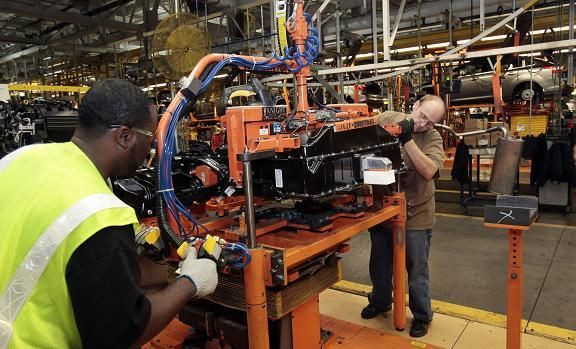If US Doesn’t Fall Off The Fiscal Cliff, 2013 Could Actually Be A Good Year For The Economy

The global economy will likely remain stuck in a twilight zone in 2013.
But at a time when Europe is struggling with an endless sovereign debt crisis, the U.K. is facing a potential triple-dip recession and China is slowing down, while Japan has also fallen into recession, the U.S. economy actually has a good chance to stand out – if it doesn’t fall off the “fiscal cliff” and also relapse into recession.
If the fiscal cliff of more than $600 billion in tax hikes and spending cuts on schedule to kick in under existing law at New Year's is avoided and steps are taken to address the medium-term fiscal problems, then one of the factors that has been holding back the U.S. economy would suddenly be removed.
“This doesn’t mean the economy will soon start firing on all cylinders. But it does mean that the foundations for faster growth in a couple of years’ time are falling into place,” notes Paul Dales, senior U.S. economist at Capital Economics. “We continue to believe that the fiscal cliff will avoided, although probably not until the very last minute.”
Third-quarter U.S. gross domestic product growth was revised to 2.7 percent annualized rate, the fastest pace in nearly three years and up from an initial estimate of a 2 percent gain. The economy is expected to grow at a 1.6 percent annualized rate in the fourth quarter, according to economists polled by Reuters.
The first three months of 2013 will likely expand by 1.5 percent, before picking up to 2.1 percent by the second quarter. For 2013 as a whole, economists expect the U.S. economy to expand by 2 percent, much the same as this year. If the fiscal cliff is not factored in, economists say GDP growth would be much higher.
Federal Reserve Chairman Ben Bernanke said on Nov. 20 that 2013 could be a "very good year" for the U.S. economy if politicians can strike a quick deal to avoid the fiscal cliff.
“Cooperation and creativity to deliver fiscal clarity -- in particular, a plan for resolving the nation's long-term budgetary issues without harming the recovery -- could help make the new year a very good one for the American economy,” Bernanke told the Economic Club of New York.
At the same time, some sectors of the economy that were at the epicenter of the recession are now supporting growth.
The NAHB homebuilders’ confidence index has recovered to 2006 levels, which indicates that actual housing starts will eventually rise by around 50 percent from current levels. At the same time, house prices have risen in each of the eight months to September and by a total of 5 percent.
Prices are expected to rise by 4 percent in 2013, as measured by the Standard & Poor's/Case-Shiller composite index of 20 metropolitan areas, according to the median forecast of 23 analysts surveyed by Reuters. Monday's poll also projected a 4 percent rise in 2014.
One main reason for the housing recovery has been a pickup in job growth. Employers added a better-than-expected 146,000 jobs in November and the unemployment rate dropped to 7.7 percent – the lowest since December 2008.
“The housing recovery will continue to provide a direct boost to GDP growth through extra homebuilding,” Dales said. “There are plenty of reasons to believe that the recent recovery is real and here to stay.”
The pressure on households to deleverage is also fading and banks have become more willing to lend, which will help consumers buy homes and help businesses boost hiring and investment.
A separate survey released Tuesday by the Institute for Supply Management showed that purchasing managers in both the factory and non-manufacturing sectors are optimistic about their overall business prospects for the first half of 2013, and are even more optimistic about the second half.
Manufacturing revenue is expected to increase 4.6 percent in 2013 from a year ago and 4.3 percent in the services sector, the ISM's semi-annual forecast said. Manufacturing revenue increased by 4 percent in 2012 over 2011 revenues, while services revenues rose 3.4 percent.
“Overall, the global economy will remain a drag on growth and there will be a small tightening in fiscal policy next year,” Dales said. That said, 2013 could be “more make than break.”
© Copyright IBTimes 2024. All rights reserved.





















